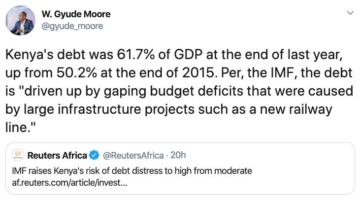
When Kenya embarked on its national infrastructure development agenda back in the early 2000s, policymakers didn’t have a lot of options when it came to financing. Traditional lenders weren’t interested and the cost of borrowing from banks was too expensive.
Enter the Chinese, who United States International University-Africa professor Elijah Munyi told a national radio audience on Spice FM’s popular morning show “The Situation Room” had the capital and, more importantly, the risk appetite to finance the country’s railways, ports, and roads.
Munyi’s discussion with host Eric Latiff was notable because it’s one of the few instances on a mass media platform where the topic of China-Africa ties did not bring up well-worn tropes like debt traps and neo-colonialism.
Key Highlights From Elijah Munyi’s Appearance on Spice FM Radio:
- [6:32] WHY DID CHINA BECOME KENYA’S LENDER OF CHOICE? “Traditionally when you look at infrastructure, which is where China has become big, that was not the traditional interest [of the West]. So, the OECD bilaterals, the way they tended to look at loans was mostly in the social sectors like education, health, and so on. China was interesting, unique, and different with their focus on infrastructure, and it’s really worked as you see the kind of infrastructure development that’s going on.
“So, the alternatives did not have the kinds of ideas that China had. The alternatives also didn’t have the kind of risk-taking that China has done in terms of the amount of money that China was willing to put in. And, therefore, to some extent, you can see why China is very attractive [as a creditor].”
- [13:43] DO YOU THINK KENYA HAS FULLY TAKEN ADVANTAGE OF THE RELATIONSHIP WITH CHINA? “I think they’ve capitalized very well in terms of capital procurement — so debt. For some years, they didn’t care what the OECD countries were doing because they could get the money we wanted from China… I would say the (Kenyatta) administration is capitalizing on the relationship with China in terms of changing their own thinking that says we don’t need to have one model so we can be looking at what China has done.
However, this is where I have a problem because I wonder if we are really looking at the Chinese model domestically to see how they raised themselves up and I don’t think we are doing that.
Watch the full interview with Elijah Munyi on the Spice FM YouTube channel.









